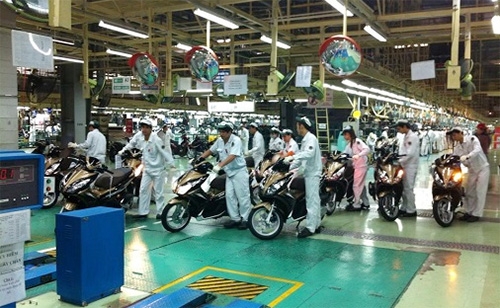Time for words to be turned into action

illustration photo source Honda vietnam
With the theme “The new phase of economic reform: from agenda to action,” the Vietnam Business Forum, a bi-annual dialogue between the government and business community, held in Hanoi on June 4, 2013 reflected the business community’s sense of urgency regarding government reforms.
“Instead of talking about solutions, thinking about solutions and making vague promises about solutions, we want to see real action from the government to solve these issues,” said AmCham chairman Mark Gillin.
Vietnam’s economy has been in crisis since 2008 as it faces the challenges of rampant inflation. And now, after five years, the economy remains uncertain with the challenges of non-performing loans and decline of purchasing power.
The Vietnamese government over the past years announced plans to implement many solutions to boost the economic growth sustainably and improve the investment climate. However, there has been little action as many proposals remain under discussion.
“We need to see tangible on the issue continually raised at these forums, as well as other concern that distracting from Vietnam’s image as an attractive destination for foreign investment,” Gillin said. “We want the government to actively reinsert confidence into the system, so that deals can get done, so that balance sheet can be cleaned up, and so that normal business activity can resume.”
He said many problems discussed at the forum were not unique to Vietnam because Vietnam was not the first country facing mismanagement, banking and bad debts and inefficient state-owned enterprises.
“Some say that these challenges are too difficult to fix and that Vietnam has a unique situation that prevents workable solutions. We don’t believe that is true and we recognise that much can be learnt from other positive and negative experiences implementing reforms,” said Gillin.
The eroding confidence of foreign investors has caused a decline of foreign direct investment (FDI) inflows since 2009. Even though FDI to Vietnam in the first five months this year increased 8.9 per cent in terms of capital commitment over the same period last year, it declined 17.9 per cent in terms of new registered projects and 32.8 per cent in terms of expanded projects.
The Vietnamese government, at a high level, still pronounces that luring FDI remains a top priority, especially when local enterprises are struggling to survive due to the internal economic challenges.
“Given the current state of the economy, Vietnam should make every effort to entice foreign investments and resources,” said David Whitehead, chairman of Australia Chamber of Commerce in Hanoi.
He warned an increasing competition in the region when other countries such as Indonesia, Thailand, Cambodia and now Myanmar have emerged as attractive investment destinations.
“If Vietnam does not create a favourable investment climate, the FDI might continue to decline,” said Whitehead.
What the stars mean:
★ Poor ★ ★ Promising ★★★ Good ★★★★ Very good ★★★★★ Exceptional
Latest News
More News
- Japanese business outlook in Vietnam turns more optimistic (January 28, 2026 | 09:54)
- Foreign leaders extend congratulations to Party General Secretary To Lam (January 25, 2026 | 10:01)
- 14th National Party Congress wraps up with success (January 25, 2026 | 09:49)
- Congratulations from VFF Central Committee's int’l partners to 14th National Party Congress (January 25, 2026 | 09:46)
- 14th Party Central Committee unanimously elects To Lam as General Secretary (January 23, 2026 | 16:22)
- Worldwide congratulations underscore confidence in Vietnam’s 14th Party Congress (January 23, 2026 | 09:02)
- Political parties, organisations, int’l friends send congratulations to 14th National Party Congress (January 22, 2026 | 09:33)
- Press release on second working day of 14th National Party Congress (January 22, 2026 | 09:19)
- 14th National Party Congress: Japanese media highlight Vietnam’s growth targets (January 21, 2026 | 09:46)
- 14th National Party Congress: Driving force for Vietnam to continue renewal, innovation, breakthroughs (January 21, 2026 | 09:42)
















 Mobile Version
Mobile Version